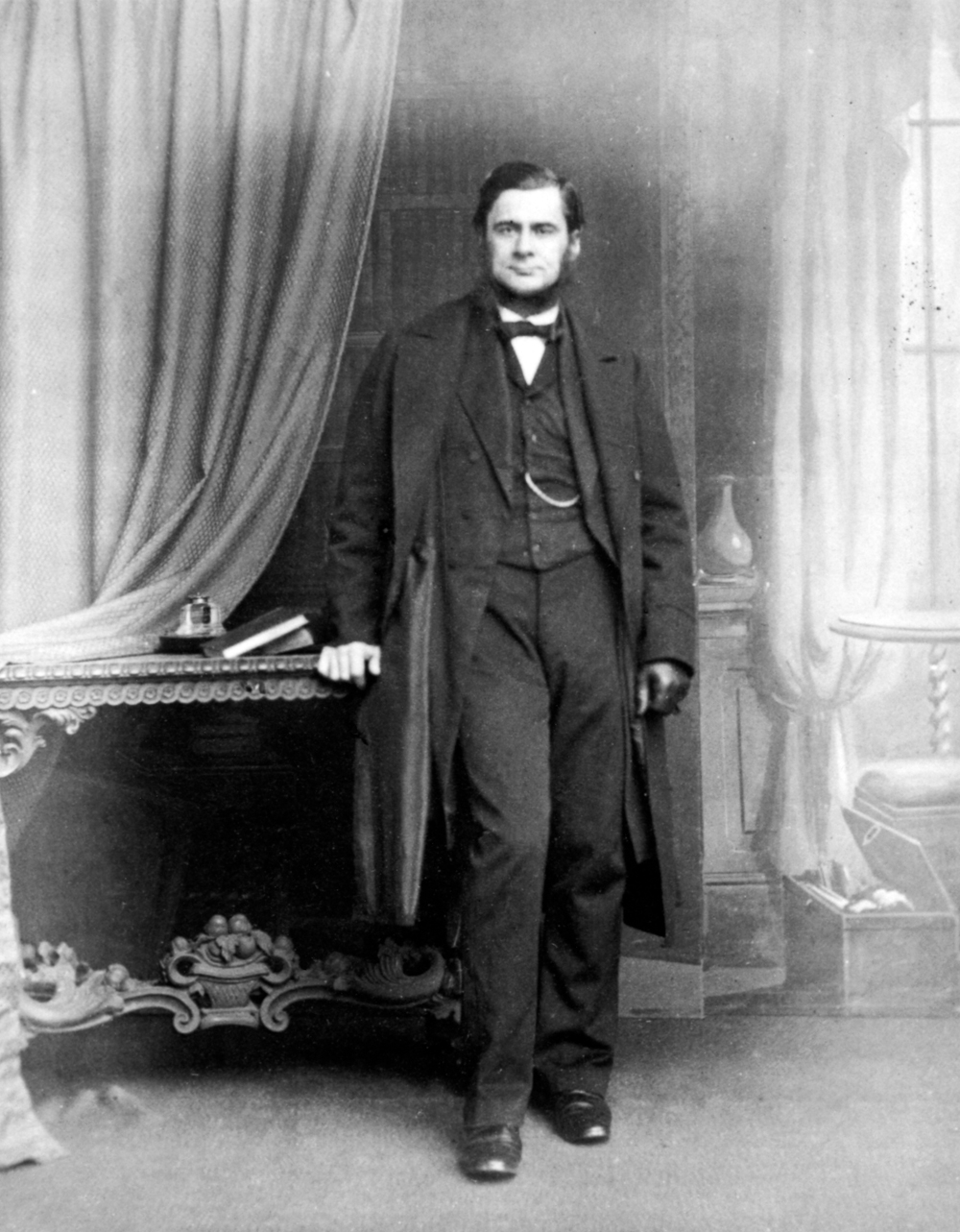Dubbed "Darwin's bulldog" for his combative role in controversies over evolution, Huxley was a leading Victorian zoologist, science popularizer, and education reformer. He was born in Ealing, a small village west of London, in 1825. With only two years of formal education, he apprenticed in medicine and then entered the navy, serving as assistant surgeon on H.M.S. Rattlesnake in the South Pacific (1846-1851). He pursued natural history alongside his medical duties, concentrating on the anatomy of marine invertebrates. Shortly after his return to England in 1851, he was elected a fellow of the Royal Society, and was awarded its Royal Medal the following year. He struggled to find a paid position in science, eventually obtaining a lectureship at the Royal School of Mines, and an appointment as paleontologist to the Geological Survey in 1854. He moved quickly to the inner circles of metropolitan science, becoming Fullerian professor at the Royal Institution, and lecturer at St. Thomas's Hospital, London. He also established himself in more public domains, giving evening 'lectures to working men', and writing a regular column on science for the Westminster Review.
Huxley became a regular correspondent of Darwin's in the early 1850s. Darwin was then at work on barnacles, and he drew on Huxley's expertise in marine animals and German science. Through the exchange of specimens and technical discussions of barnacle anatomy, the men became friends, with Darwin addressing his younger colleague as 'my dear Huxley' for the first time in a letter of 20 February [1855]. Darwin did have reservations about Huxley's hostile criticism of eminent authorities, such as George Cuvier, Richard Owen, and Louis Agassiz (see letters to J. D. Hooker, 9 May 1856 and 21 May 1856). But he considered Huxley a valuable ally, and invited him to Down in 1856, showing him his many pigeon varieties. At the time, Huxley was committed to a theory of zoological types in which every creature was conceived as a modification of a small number of fixed forms, with no transitional species. Huxley's defense of the type system was often pitched against progressive or transmutationist theories, including those of Owen, Agassiz, and the anonymous author of Vestiges of the Natural History of Creation. Darwin carefully broached the subject of transmutation with Huxley (see for example his letter of 23 April 1853), but he did not reveal his own theory of descent until the presentation of the joint paper with Alfred Russel Wallace to the Linnean Society in 1858.
Despite his previous opposition to transmutation, and despite persistent reservations about the role of natural selection, Huxley became an outspoken defender of Darwin and a popularizer of Darwinian theory almost immediately after the publication of Origin of Species in 1859. He presented lively summaries of Darwin's views in popular forums, such as his working men's lectures, the London Times, and Macmillan's Magazine. In a series of technical papers in palaeontology, comparative anatomy, and physical anthropology, he argued for the affinity of humans and apes, engaging in a protracted controversy with Owen, who had placed humans in a distinct subclass based on perceived differences in brain anatomy. Sometimes Huxley used these more specialist debates as platforms for wider campaigns of institutional and cultural reform, as in his famous clash with the bishop of Oxford, Samuel Wilberforce, at the 1860 meeting of the British Association. While continuing to promote Darwinian theory publicly, Huxley favoured a view of evolution per saltum (or by leaps) rather than by the gradual accumulation of small variations. Saltationism enabled Huxley to retain his commitments to the type system, which he continued to employ both in his own research and in his teaching. Huxley's own evolutionary theorizing remained rooted in assumptions about distinct zoological classes, although he now argued that there were ancestral links between them. In a series of papers beginning in 1868, he proposed that dinosaurs were transitional forms between reptiles and birds.
The friendship between Huxley and Darwin grew closer over the years. In promoting Darwinism in public lectures and addresses, Huxley often appealed to the character of Darwin himself, his "truthfulness and honesty", his "genial, simple, and generous nature" (Huxley 1871b). Darwin was delighted by Huxley's forceful writing and relieved that he did not have to enter into public controversy. Huxley for his part seemed to relish the opportunity to come to Darwin's defense. In 1875, he intervened in a bitter and personal dispute between Darwin and St George Jackson Mivart, portraying the Catholic zoologist as a mouthpiece of 'Jesuitical Rome'. "How grandly you have defended me", Darwin wrote on 6 January 1875, "you have indeed been a true friend." Over the years, Huxley made a number of visits to Down with his wife Henrietta and their young children, one of whom became a favourite of Darwin's. On several occasions, Darwin helped Huxley out of severe financial difficulties, including a large sum to pay for their moving house. After receiving this gift, Henrietta Huxley wrote to Darwin on 17 November 1872: "You are like the man-who had been all his life talking prose without knowing it and in this more than brotherly kindness ... make poetry of your life".
Huxley died in 1895, survived by Henrietta and their seven children. His writings, teaching, and administration helped to define the 'man of science' as a public figure and to reshape the institutions of British science in the second half of the nineteenth century.
Huxley, review of Ernst Haeckel's Anthropogenie, Academy, 2 January 1875
ODNB article: https://doi.org/10.1093/ref:odnb/14320



